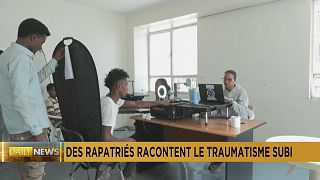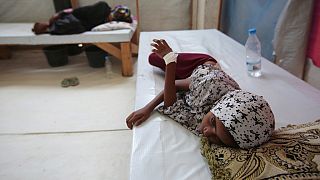Ethiopia
More than 50 civilians were killed in attacks in Ethiopia in November, denounced the Ethiopian Human Rights Commission (EHRC) on Wednesday, two weeks after negotiations between the government and the Oromo Liberation Army (OLA) ended without agreement.
Classified as a "terrorist organization" by Addis Ababa, the OLA has been fighting the Ethiopian authorities since its split with the historic Oromo Liberation Front (OLF) in 2018, when the latter renounced armed struggle that year when current Prime Minister Abiy Ahmed came to power.
According to the EHRC, a statutorily independent public institution, OLF fighters killed 17 people and burned villages in Benishangul-Gumuz, northwest Ethiopia.
The EHRC also claimed that a further 30 people were killed in the Arsi zone of Oromia in a series of attacks by unidentified assailants, the victims including several members of the same family.
"The assailants killed the victims by lining them up after taking them out of their homes, while others were killed inside their homes," EHRC said in its report.
"Among the victims are a baby, a pregnant woman, and an 80-year-old (...) An undetermined number of injured people are currently receiving medical treatment."
"Nine members of the Lutheran church in the diocese of Hamo-Tokuma", in the Oromia region, "were killed by as yet unidentified assailants on November 25", EHRC also claimed.
All the attacks took place between November 23 and 29, after negotiations between the government and the OLA ended without agreement in Tanzania on November 21, with both parties blaming each other.
On Saturday, local Oromia authorities accused the OLA of having "perpetrated horrific acts against peaceful citizens, brutally killing many (...) in the Arsi area".
Estimated at a few thousand men in 2018, its numbers have greatly increased in recent years, although observers consider it insufficiently organized and armed to represent a real threat to Ethiopia's federal power, even though the capital is hemmed in by Oromia.
The Oromo people's region stretches from center to south and east to west, covering around a third of Ethiopia's territory, and is home to around a third of the 120 million inhabitants of Africa's 2nd most populous country.
It is plagued by multi-faceted violence, making the situation extremely confusing: internal political struggles, territorial disputes, and animosities between communities combined with the recent development of armed banditry.













01:15
Nigeria sentences 44 people to hard labour for financing Boko Haram militants
01:14
Boeing reaches settlement with man who lost entire family in 737 MAX Crash
01:13
China and Ethiopia reaffirm alliance at meeting on sidelies of BRICS summit
01:13
17 soldiers killed as gunmen raid army bases in northern Nigeria
01:15
Kenya court sentences two to jail terms for aiding 2019 hotel attackk
Go to video
Sheep markets struggle in Niger ahead of Eid al-Adha amid insecurity and economic strain